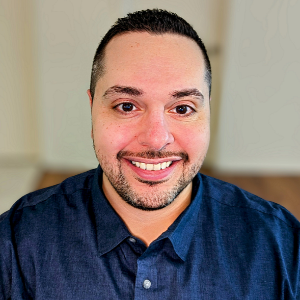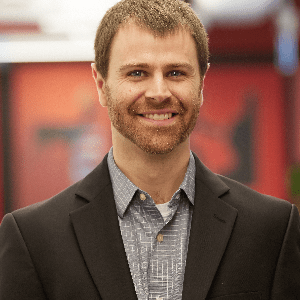I’m a computer engineer transformed into a ⚙️ passionate No Coder ⚙️. Reach out if you want to get introduced or learn more about the No Code world!
Lessons Learned: Growth for B2B Enterprise SaaS with Andrew Bolis
At B2B Enterprise SaaS, great marketing is a combination of things you can measure and things you cannot measure. Smart companies invest in things like brand, content, and having a mission of some sort.
In this Growth Mentor Podcast episode, we're diving into the world of B2B Enterprise SaaS with our awesome guest, Andrew Bolis, a top-notch fractional CMO and B2B growth advisor.
You’ll hear about:
- What B2B Enterprise SaaS is all about
- The hurdles companies face at various stages, like Series A, B, and C
- Why syncing marketing and sales is super important for success
- What makes founders, CMOs, and heads of sales total rockstars in this space
And all these in just 8 minutes.
Transcript
Spyros Tsoukalas: Hello, everyone. Let’s welcome Andrew, who is a former CMO at the Series B tech company in the area of market research. I’m excited to talk with Andrew about Growth for B2B Enterprise SaaS. So, Andrew, welcome to the Growth Mentor Podcast.
Andrew Bolis: Thank you for having me.
Spyros Tsoukalas: Yeah, I’m very curious to learn more about the topic today. So can we define what B2B Enterprise SaaS is?
Andrew Bolis: Sure, I’ll give you my definition of it. And my experience with it having worked at a few B2B SaaS Enterprise companies. So usually, it’s software that’s sold primarily to large enterprise companies. So you’re looking at like 100k plus annual contract value, a buying committee of about 5 to 10 people or so that you’re trying to get to purchase the software, and then a six to 12-month sales cycle?
Spyros Tsoukalas: Wow, that’s that’s a big process. So, I already learned something new. I didn’t know that. But could you tell us something we don’t know, or most people don’t know about Growth at B2B Enterprise SaaS?
Andrew Bolis: Sure, so the biggest thing is that it’s very targeted. So you usually start out by mapping, what types of companies are a good fit for your software, because of the large contract value. Obviously, that eliminates a lot of potential companies. From there, you’re doing a lot of, you know, I guess you’re doing a lot more account engagement versus lead gen or things like that. And it’s a combination of targeted brand awareness, typical marketing channels, and initiatives. And then also things like strategic BDR and SDR outreach, to engage those accounts.
Spyros Tsoukalas: So, how such companies grow across different stages of their life changes. So, what are the common challenges that they face, like the first stage or for some kind of first, like, separation that we will make?
Andrew Bolis: Sure, so I’ll talk through Series A, B, and C. So Series A, usually, at least the way I define it before I get into challenges is up to 5 million in ARR. At this point, they’re obviously founder-led. And they’ve made very early investments into maybe marketing and sales and things like that. Some of their challenges are that product market fit has not been established. They also typically have a diverse group of early customers or early adopters, mostly from the founders’ own network, and relationships. And then they’re still developing product messaging, positioning, and differentiation. So that’s a Series A. Series B, I define as like up to 20 million and ARR. At this point, it’s a bit more I get on the enterprise side, a little bit more sales lead, and there is some product market fit. And then the company started to make bigger investments in marketing and sales to grow. Usually, the challenges at that stage are really like nailing down the product market fit, specializing, or niching, down to specific market segments. Instead of having like a general purpose software, and then starting to build customer loyalty with some of those early customers. At the Series C stage, usually, the companies are up to 50 million in ARR, their sales and marketing lead at that point, they have a concrete product market fit. And a lot of their focus is on customer retention and expansion, in order to grow. Some of the challenges they went into is differentiating, because now there are more competitors in their space, lowering customer acquisition costs while still growing. And then thinking about how and when to expand, whether that’s introducing new product lines or trying to enter new markets.
Spyros Tsoukalas: So, having experiences in this space, what’s your approach?
Andrew Bolis: So, specifically at Enterprise SaaS, I think that the biggest thing is having a very close alignment between marketing and sales, because your requires a comprehensive approach, to create awareness-engaged accounts, and then ultimately, turn those accounts into customers. And one of the best ways I’ve seen that done is where the head of marketing and the head of sales are both equally responsible for a pipeline generation goal and also the revenue growth goals. So that way, they’re both sort of working hand in hand to you know, help the company grow.
Spyros Tsoukalas: So, along those stages, like, what do you think are the characteristics that make like great people, like in the case of founders, or in the case of CMOS, like, what characteristics are suitable for such companies? Those stages?
Andrew Bolis: Sure, so I think for founders, there’s two things, I think, great founders realized that what worked when they were like a seed company versus Series A versus B or C is not the same thing. So they kind of adapt and learn along the way. I think founders would struggle, they’ll be running a Series C Company the same way they read it, what a Series A, which doesn’t work. And I think the smartest founders, hire great talent, who bring in a lot of experience, especially in areas where the founder just is not that experienced. And then they just get out of their way and kind of let them sort of give them kind of freedom to be creative, and to get things done. So that’s founders and sort of CEOs of startups. I think for CMOs and heads of marketing, I think it’s really understanding the market, and the competitors, seeing trends that are coming up, thinking ahead of time and just being a visionary instead of just an operational leader.
Spyros Tsoukalas: And what about the CROs or head of sales?
Andrew Bolis: CROs and heads of sales I think it’s it’s prioritizing things like sales enablement, training, constantly up leveling the sales team, adapting to market challenges, and there’ll be a lot of them like competitors and things like that coming up. And then passing feedback back to marketing and customer success. I think the advantage the sales team has is that they’re kind of in the field, they’re constantly talking to prospects and customers. And sometimes they know a lot more, but that knowledge just doesn’t transfer back into like marketing and customer success.
Spyros Tsoukalas: So, following what makes great people for such startups, I want to generalize it a little bit and ask what makes great marketing at the companies that have been discussed so far.
Andrew Bolis: Sure. So I think I think great marketing is a combination of things you can measure and things you cannot measure. But you know, also, kind of uplift all the channels you can measure. So, I think, you know, companies run into problems when they only focus on channels where you can measure everything. I think smart companies also invest in things like brands, they invest in content. And they usually invest in like having a mission of some sort, and values that they express and they also bring up or sort of bring great stories along the ways and all of that kind of uplifts, their advertising, their website, their SEO, all the performance stuff sees an uplift from.
Spyros Tsoukalas: Andrew, thanks for taking the time to share your insights with us today. I really appreciate all this know-how that you shared with us. I learned a lot and I hope that people will also learn while listening to this episode.
Andrew Bolis: Sounds good. Thank you for having me.
In this episode


Successful CMO who drives business growth: ● 15 yrs of marketing leadership experience as Mgr/Dir/CMO ● Drove revenue growth from Series A to Series E stages at startups ● Focus: Go-to-market, brand awareness, demand gen, customer marketing
Join the community
Enjoy the peace of mind that advice is always only one Zoom call away.

